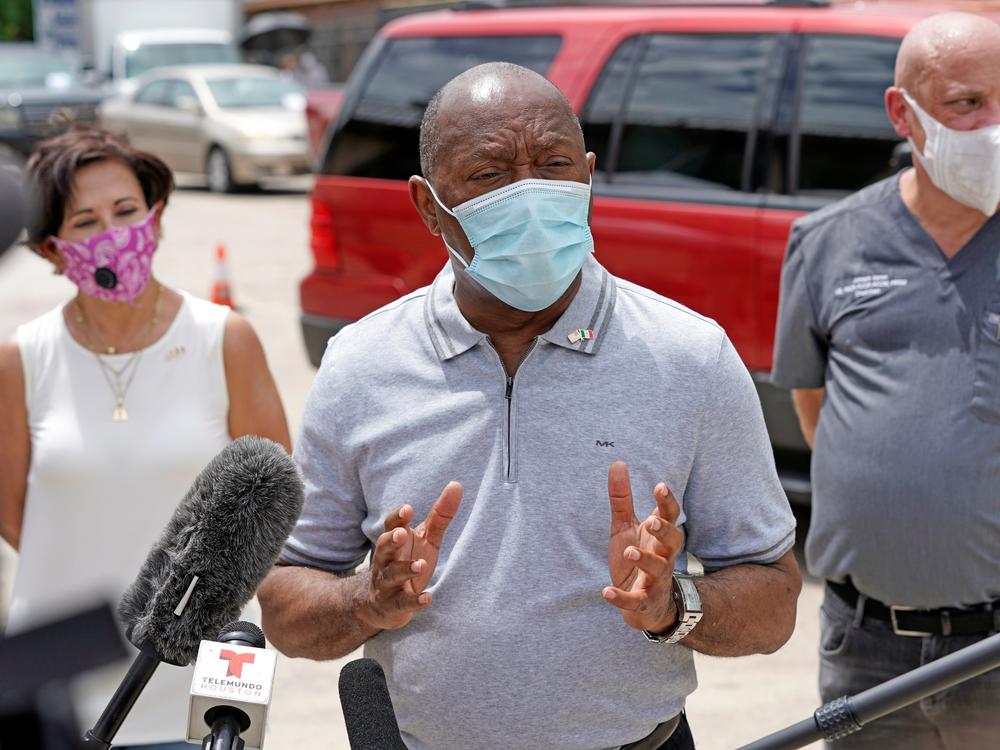Section Branding
Header Content
Houston's COVID-19 Cases Level Off After Sudden Surge In Late June
Primary Content
After a sudden surge in reported COVID- 19 cases beginning at the end of June, Houston's daily case count and hospital admission rates seem to be leveling off. Health officials say they're not ready to determine if the data are statistically significant yet, but it's a positive trend. Last Friday, experts were ringing alarm bells.
"I just want to put in perspective for those folks who don't see what the issue is. In your experience, you may not know anybody who's sick, and you may not know anybody who's died ... yet," says Dr. David Persse, health authority for the Houston's Health Department.
Houston hospitals are not overwhelmed, though they've moved into what the Texas Medical Center calls the secondary ICU surge plan. Collectively, the center's hospitals are using just under 5% of those surge ICUs. However, Houston's two hospitals owned and operated by the county say that COVID-19 patients are taking up more than half of their ICU beds.
"That number has creeped up over the last two to three weeks. We've been lucky to have a lot of coordination with the Texas Medical Center in an effort to try to transfer patients," says Mike Hill, chief operating officer for the Harris Health System.
Still, the system is under stress. There are staffing shortages as healthcare workers themselves are coming down sick with COVID-19. This has meant that some nurses without infectious disease expertise are nonetheless caring for COVID-19 patients.
Oil prices have recovered somewhat, but a plunge earlier has caused thousands of layoffs in the city's dominant industry. And the county's stay-at-home order in April, decimated local restaurants with 10% of them now closed for good, according to the Greater Houston Restaurant Association.
"If you've been able to convert to curbside or to go, then that's been somewhat helpful" says Melissa Stewart, president of the Greater Houston Restaurant Association. "But if you can't, and now all of a sudden you have to close for another two weeks, all your product is perishable. Which means for two weeks, everything you have doesn't last. And you have to restock again, so just a tremendous amount of expense."
A report from the University of Houston says the city will be in a "moderate recession" in the first quarter of next year should the virus "run its course" this year. That could mean the loss of more than 70,000 jobs.
Texas Gov. Greg Abbott says that another shutdown won't happen.The Republican chief executive took power away from Houston's leaders to issue another, "Stay Home, Work Safe" order.
This leaves hospitality workers in a difficult situation. With the positivity rate hovering around 24-25% at city testing sites, COVID-19 transmission is clearly active within the community.
"We are going to lose our health insurance, as of Aug.1. And I'm worried, what if I get sick?" furloughed waitress Cynthia Pratt says.
It's become a common problem for employees, deciding between one's health, and one's paycheck, specifically in Houston's Latino community. They make up roughly 40% of reported COVID-19 cases here.
"There's a lot of people with anxiety, depression. And there's an increase in substance, alcohol and domestic violence," says Rev. Ed Gomez, at San Pablo Episcopal Church.
That anxiety is two-fold. First, most of Gomez's community cannot work from home, he says. Second, a moratorium on evictions will lift this Saturday setting up what some city officials say will be an "Eviction Doomsday."
"I just had to write a letter to a property manager promising that we would pay July rent, so that they do not evict the person, an elderly person," Gomez says.
The direction of the pandemic here is showing some hopeful signs, though. Monday the Houston Health Department said hospitals are doing better at treating COVID-19 patients, resulting in shorter hospital stays compared to the beginning of the pandemic.
But health officials caution that hospitals could still become overwhelmed if people don't strictly follow recommendations to socially distance and wear masks.
"I do think we can never say never. ... A lot of it depends on what happens in our community and all the actions that we take, whether it's individually or collectively. That's going to determine where we as a community go," says Umair Shah, executive director of Harris County Public Health.
Copyright 2020 Houston Public Media News 88.7. To see more, visit Houston Public Media News 88.7.

